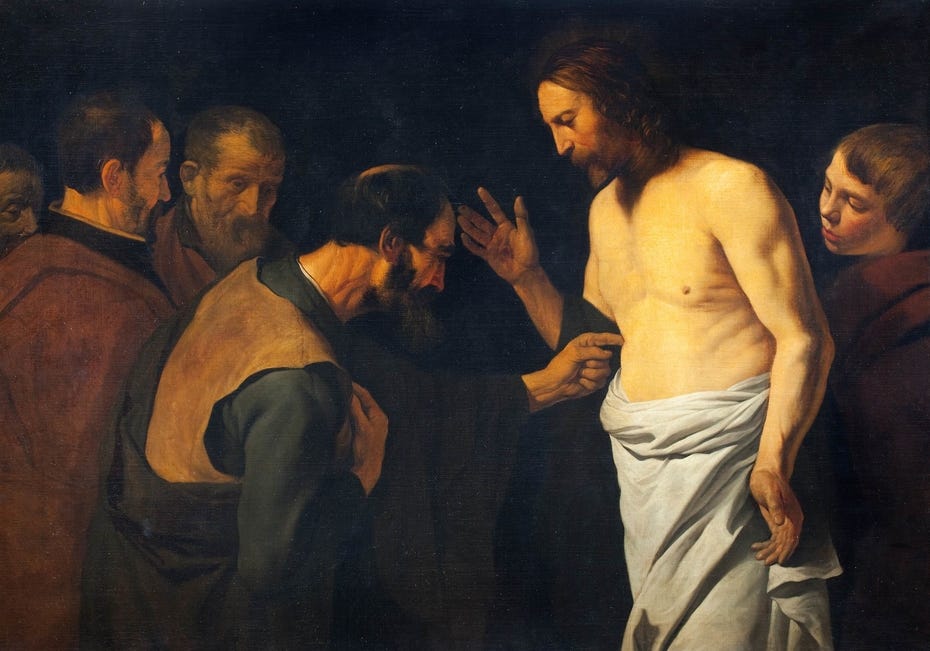For the past three years, no apostle has quite spoken to my heart like poor doubting Thomas. Firstly, can you imagine your name being preceded by your greatest shortcoming? I will refrain from sharing what mine would be.
It is easy to rashly judge Thomas but what an unreasonable story to believe! That the Rabbi he abandoned to suffer and die on the cross as a common criminal could be alive. Maybe Thomas was actually more afraid of it being true and the repercussions of that truth. How would he ever be able to face Christ if this was true? But this story wasn’t passed on from an unreliable source. These were his friends who intimately knew Jesus and would not have easily confused him for some random stranger. But despite these facts, Thomas’ heart remained hardened. Possibly he questioned why the Lord would appear when he just happened to be gone, making it seemingly more difficult for Thomas to believe.
So, for one week the Lord allowed his heart to remain hard. How difficult that week must have been. Alone in doubt as others were joyful and stood firm in the fact that the Lord had risen. How much energy must it have taken to wallow in the mire of doubt and look with suspicion at those who share this good news?
Thomas puts limits on how the gift of faith is given, insisting that physically touching the wounds of Christ will be the ONLY way that he believes. How many times do I do this? “Lord, I will have faith if you heal this loved one or this broken marriage. I will have faith if you bring me success or love.” Faith becomes a bargaining chip rather than the gift it was meant to be. We try to place limits on God through whom we hear that all things are possible
But in the hardness of heart, how much do we miss? During that week, how many times did the Lord try to appear to Thomas? We know that the Lord’s resurrected body was able to be hidden from human eyes. If Thomas looked back, would he have seen times where the Lord extended the gift of faith? I know that I have put these same limitations on God and have often missed the gift.
But Jesus loves Thomas too much to allow him to remain hopeless. He returns to the locked room and offers Thomas the opportunity to touch the marks of the nails and place his hand in his side to approach his sacred and pierced heart. All these wounds offered with love as a response to Thomas’ lack of love. However, the hardness of Thomas’ heart melts under the gaze of the Lord. He no longer needs to touch Jesus’ wounds or heart to believe because Jesus himself has touched Thomas’ heart. The Lord transforms Thomas’ stony heart to a heart of flesh, able to receive what God offers: faith.
Too often we forget that faith is a gift given directly by God. You can ask for a gift but to demand a gift, defeats the purpose of a gift, which is freely given. I cannot conjure up faith as hard as I may try and typically this only leads to further frustration as we look to ourselves rather than God. The best that I can offer on the days that I doubt is to dispose myself to receive this gift and continue to walk in trust within the darkness. The irony is this itself is an act of faith.
So, I look to Thomas as a mentor and friend, an intercessor and a sign of hope. God is faithful despite my lack of faith. God is trustworthy even if I listen to the lies of the world or the enemy. God is merciful even when I can’t extend that mercy to myself or others. Thankfully, God’s goodness does not depend on my own. Despite Thomas’ doubt, God did not doubt his choice of Thomas. And the same applies to us and this is truly good news. That even if the Easter joy subsides and we re-enter the tomb and the darkness of doubt rises in our hearts, if we remain with Christ, he will approach us with his lovely wounds, softening our hearts and ultimately transforming us into the saints he calls us to be.
St. Thomas, pray for us.
Christina Betta lives in Catonsville, works as a veterinarian, and is slowly becoming a regular contributor to Ecclesia Christi Baltimore.



